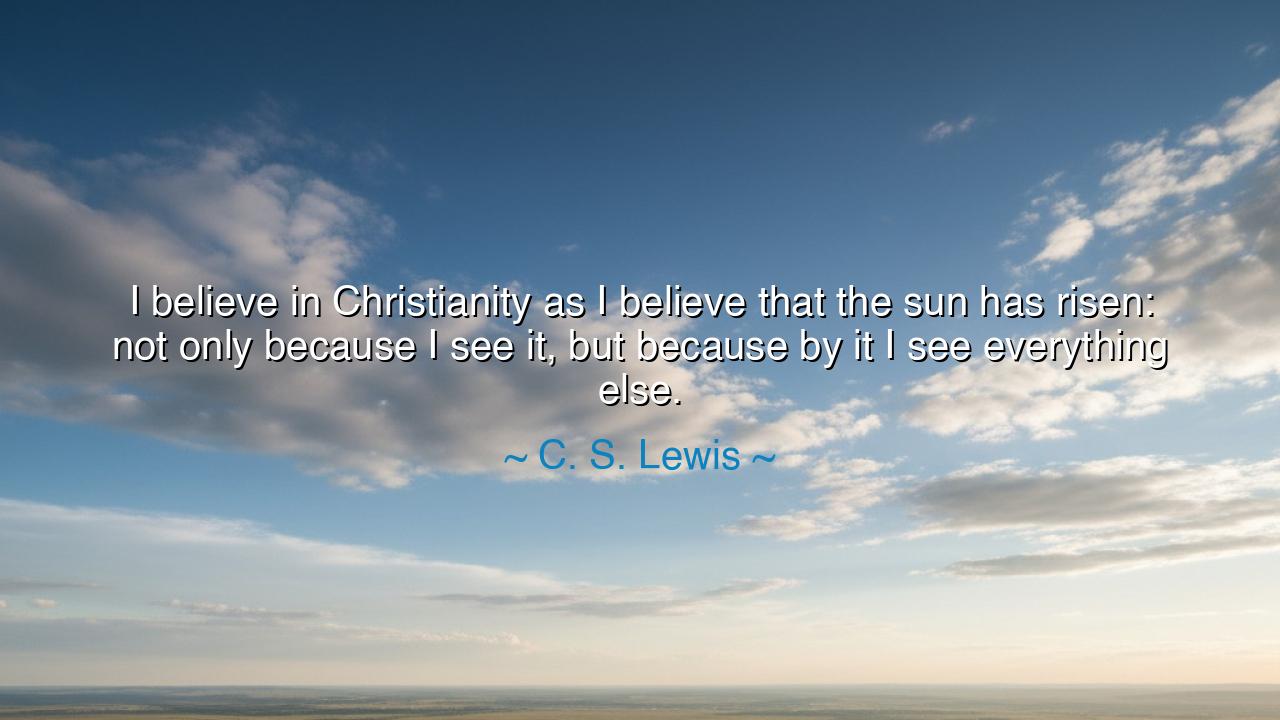
I believe in Christianity as I believe that the sun has risen:
I believe in Christianity as I believe that the sun has risen: not only because I see it, but because by it I see everything else.






Hearken, O seekers of truth and illumination, to the words of C. S. Lewis, the great scholar and philosopher of faith, who proclaimed: “I believe in Christianity as I believe that the sun has risen: not only because I see it, but because by it I see everything else.” In this sentence of light and revelation, Lewis speaks not of blind belief, but of faith as vision — a faith so profound that it becomes the very lens through which all of life is understood. His words are both confession and metaphor, born from his own pilgrimage through doubt into conviction, through shadow into sunrise.
Lewis, once an avowed atheist, did not come to Christianity by sentiment or inheritance, but by the slow awakening of intellect and spirit. His early life was spent questioning the divine, searching for meaning in reason alone. Yet in time, he found that the human mind — brilliant though it may be — cannot illuminate all mysteries unaided. The sun in his analogy is Christ Himself, the source of light and truth. To Lewis, believing in Christianity was like standing in the dawn: it was not only seeing the sun, but realizing that every mountain, river, and path could be seen because of it. Without the divine light, the world remains visible only in fragments, half-hidden in shadow and uncertainty.
To say “by it I see everything else” is to recognize that faith transforms perception. In the same way that sunlight reveals both beauty and blemish, so does spiritual truth illuminate the meaning of suffering, love, morality, and purpose. The believer no longer wanders blind through existence but walks in a world infused with divine significance. Lewis implies that Christianity is not merely one belief among many; it is the framework through which all other knowledge becomes coherent. The intellect may discover truths, but faith allows one to see their meaning.
Consider the example of St. Augustine, who, like Lewis, wrestled with disbelief before surrendering to the light. For years he sought wisdom in philosophy, pleasure, and power, yet found himself restless and unfulfilled. When at last he turned to God, he exclaimed, “You have made us for Yourself, O Lord, and our hearts are restless until they rest in You.” Augustine too had seen the sunrise after long darkness — he believed not because he had mastered the world, but because the light of faith revealed it as it truly was. His transformation mirrors the revelation Lewis describes: that the light of faith does not destroy reason, but completes it.
Lewis’s image of the rising sun also speaks to renewal — to the dawning of hope after the night of confusion. Every soul, he suggests, must face its own dark hours. There are moments when doubt covers the sky, when one feels abandoned or adrift. Yet even before the full sun breaks over the horizon, its faint rays already reveal the path ahead. Faith, then, is not certainty but orientation — the trust that though we may not yet see all, the light will come, and when it does, the world will be made clear. To believe is to live in that expectation, to rise each day with the assurance that meaning exists, even when veiled by mist.
The lesson of Lewis’s wisdom is thus both intellectual and moral. Do not seek faith as a feeling, nor as an escape from thought, but as the harmony of both heart and reason. To believe as Lewis did is not to close one’s eyes to the world, but to open them more fully — to perceive truth in all things, to see beauty in creation, and to find purpose even in pain. The light of the sun does not make the shadows vanish; it gives them context and shape. So too does faith give meaning to both joy and sorrow, triumph and loss.
Let this teaching, then, be carried forward: Seek the light not to stare at it, but to see by it. Faith is not the end of the journey, but the dawn that makes the journey possible. Like Lewis, allow your reason to lead you to the edge of belief, and your belief to deepen your reason. For in the union of both, the human soul finds sight — not only of God, but of everything that is. And when you stand at last in that radiant sunrise, you will understand his words anew: “I believe in Christianity not only because I see it, but because by it I see everything else.”






AAdministratorAdministrator
Welcome, honored guests. Please leave a comment, we will respond soon